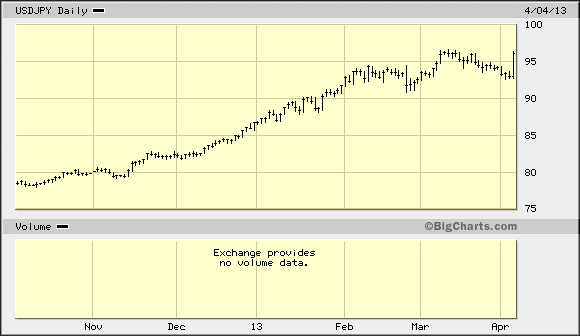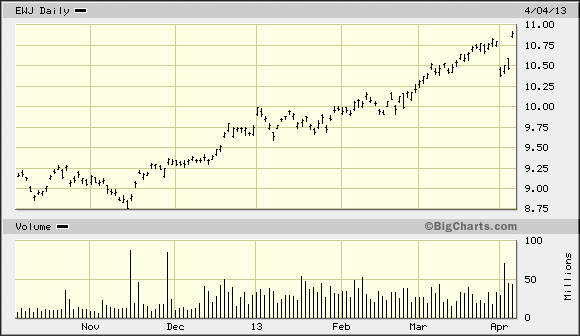When it comes to quantitative easing, Fed Chairman Ben Bernanke is playing AA minor league ball at best. If he ever wants to make the big leagues, he needs to take batting practice with Japan’s new central bank governor, Haruhiko Kuroda.
In addition to the “usual” quantitative easing actions of buying government bonds, the Bank of Japan will be buying 30 billion yen of Japanese real estate investment trusts and a trillion yen of exchange traded funds…annually!
By Forbes estimates, the new expansion in Japan’s monetary base amounts to 10% of Japan’s GDP. By comparison, Bernanke’s QE Infinity is less than 7% of U.S. GDP.
Not surprisingly, Japanese stocks surged on the news. We talk about the Fed “propping up” the stock market here (and conspiracy theorists have long accused the “Plunge Protection Team” of manipulating the markets), but we’ve never had the Fed directly jumping into the stock market like this.
What does this mean for Japanese stocks going forward? Or the yen? USD/JPY: Daily" width="580" height="336">
USD/JPY: Daily" width="580" height="336">
The standard “don’t fight the Fed” advice applies here, at least in the short term. The Bank of Japan is determined to push the value of the yen down to boost exports and to shake the economy out of its long deflationary funk. It’s much easier for a central bank to destroy the value of its currency when it is expensive than to prop up its value when it is falling.
So, don’t try to be a hero here by betting against the Bank of Japan. Remember, George Soros made his legendary “bankrupt the Bank of England” trade by shorting the pound when the BoE was trying to prop it up. Not even Soros the Great and Powerful could have succeeded in a long bet against a central bank this determined to weaken its currency.
Let’s take a look at how the yen has performed of late (Figure 1). You have to view this graph in reverse; a rising line means a falling yen relative to the dollar. (Think of it like this; back in November, a dollar would have bought you 80 yen; that same dollar today will buy you 96 yen.)
The yen has been in virtual free fall since it became obvious that Prime Minister Shinzo Abe would win last year’s election, though the yen rose sharply for most of March due in large part to the turmoil coming out of Europe.
Perversely, given Japan’s debt load, the yen became a “haven” currency following the unwinding of the carry trade in 2008 (which should put the nail in the coffin of any ideas you might have had about markets being rational). So, if Europe has another destabilizing wave of volatility, then the yen might enjoy a brief respite. But overall, the yen’s downward trend will likely continue for a while.
What about Japanese equities?
Japanese stocks, measured by the iShares MSCI Japan ETF (EWJ), have been on a tear since mid-November (Figure 2), coinciding with the yen’s decline. And over the next, say, three to six months, I expect this trend to continue.
But be careful here; Japanese stocks should be viewed as a short-term trade, and most definitely not a long-term investment. In the not-too-distant future, I expect Japan to bust apart at the seams. If the Bank of Japan is successful in reigniting inflation, Japanese bond yields will rise. And when Japan’s financing costs rise, that gargantuan pile of debt (currently 220% of GDP) becomes a lot harder to service.
As I wrote in February, debt service now accounts for 43% of Japanese government revenues and quarter of all spending. Furthermore, more than half of all Japanese government spending is financed by new borrowing. This means that half of every yen borrowed is used to service existing debts. It’s a debtor’s nightmare that gets worse every year with budget deficits that are consistently higher than 7% of GDP.
The bond vigilantes will eventually wake up and take note of these sobering statistics, and when they do things are likely to deteriorate very quickly. Think banana republic levels of hyperinflation followed by outright default.
Amazingly, Japanese yields continue to fall for now. The 10-year Japanese bond now yields an almost unbelievable 0.45%. At these levels, shorting Japanese bonds becomes an almost risk-free proposition.
When yields finally begin to rise, get ready for the short opportunity of a lifetime in virtually all Japanese assets. In the meantime, keep an eye on the 10-year yield. When it rises above the 1.0-1.5% level, I expect doomsday to follow shortly thereafter.
Disclaimer: Charles Sizemore currently has no positions in any security mentioned.
The post What’s Next for the Yen and Japanese Stocks? appeared first on Sizemore Insights.
Related posts:
- English (UK)
- English (India)
- English (Canada)
- English (Australia)
- English (South Africa)
- English (Philippines)
- English (Nigeria)
- Deutsch
- Español (España)
- Español (México)
- Français
- Italiano
- Nederlands
- Português (Portugal)
- Polski
- Português (Brasil)
- Русский
- Türkçe
- العربية
- Ελληνικά
- Svenska
- Suomi
- עברית
- 日本語
- 한국어
- 简体中文
- 繁體中文
- Bahasa Indonesia
- Bahasa Melayu
- ไทย
- Tiếng Việt
- हिंदी
What’s Next For The Yen And Japanese Stocks?
Published 04/05/2013, 10:01 AM
Updated 07/09/2023, 06:31 AM
What’s Next For The Yen And Japanese Stocks?
Latest comments
Loading next article…
Install Our App
Risk Disclosure: Trading in financial instruments and/or cryptocurrencies involves high risks including the risk of losing some, or all, of your investment amount, and may not be suitable for all investors. Prices of cryptocurrencies are extremely volatile and may be affected by external factors such as financial, regulatory or political events. Trading on margin increases the financial risks.
Before deciding to trade in financial instrument or cryptocurrencies you should be fully informed of the risks and costs associated with trading the financial markets, carefully consider your investment objectives, level of experience, and risk appetite, and seek professional advice where needed.
Fusion Media would like to remind you that the data contained in this website is not necessarily real-time nor accurate. The data and prices on the website are not necessarily provided by any market or exchange, but may be provided by market makers, and so prices may not be accurate and may differ from the actual price at any given market, meaning prices are indicative and not appropriate for trading purposes. Fusion Media and any provider of the data contained in this website will not accept liability for any loss or damage as a result of your trading, or your reliance on the information contained within this website.
It is prohibited to use, store, reproduce, display, modify, transmit or distribute the data contained in this website without the explicit prior written permission of Fusion Media and/or the data provider. All intellectual property rights are reserved by the providers and/or the exchange providing the data contained in this website.
Fusion Media may be compensated by the advertisers that appear on the website, based on your interaction with the advertisements or advertisers.
Before deciding to trade in financial instrument or cryptocurrencies you should be fully informed of the risks and costs associated with trading the financial markets, carefully consider your investment objectives, level of experience, and risk appetite, and seek professional advice where needed.
Fusion Media would like to remind you that the data contained in this website is not necessarily real-time nor accurate. The data and prices on the website are not necessarily provided by any market or exchange, but may be provided by market makers, and so prices may not be accurate and may differ from the actual price at any given market, meaning prices are indicative and not appropriate for trading purposes. Fusion Media and any provider of the data contained in this website will not accept liability for any loss or damage as a result of your trading, or your reliance on the information contained within this website.
It is prohibited to use, store, reproduce, display, modify, transmit or distribute the data contained in this website without the explicit prior written permission of Fusion Media and/or the data provider. All intellectual property rights are reserved by the providers and/or the exchange providing the data contained in this website.
Fusion Media may be compensated by the advertisers that appear on the website, based on your interaction with the advertisements or advertisers.
© 2007-2025 - Fusion Media Limited. All Rights Reserved.
